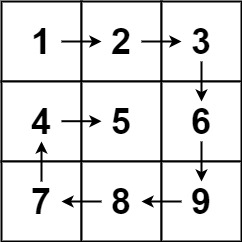Leetcode: Spiral Matrix
Problem Description
Problem definition is taken from leetcode.
Given an m x n matrix, return all elements of the matrix in spiral order.
Example 1

Input: matrix = [[1,2,3],[4,5,6],[7,8,9]]
Output: [1,2,3,6,9,8,7,4,5]
Example 2

Input: matrix = [[1,2,3,4],[5,6,7,8],[9,10,11,12]]
Output: [1,2,3,4,8,12,11,10,9,5,6,7]
Solution
Solution involves depth-first search and backtracking.
The approach uses the fact that the spiral traversal requires change in only one axis. Given a matrix having i rows and j columns, at any step either i axis or j axis changes. Another fact is change axis and direction does not change until a corner is reached.
There are two kinds of corners: actual and visited.
- Actual corners are invalid matrix indices. For example i or j indices cannot be less than zero.
- Visited corners are matrix elements that are already visited. The solution requires the visited matrix elements are marked with value None.
First column index is incremented. Then on the first corner, row index is incremented. Then on the first corner column index is decremented. Then on the first corner, row index is decremented. Then on the first corner, column index is incremented again.
Space complexity is O(1): No extra space is used. Time complexity is O(ij): i is the number of rows, j is the number of columns.
class Solution:
def spiralOrder(self, matrix: List[List[int]]) -> List[int]:
result=[]
self.df(matrix, 0, -1, 0, 1, result, 0)
return result
def df(self, m, i,j,di,dj, result, marked):
ni=len(m)
nj=len(m[0])
# print("df", i, j,"d",di,dj)
if marked == ni*nj:
return
ip = i+di
jp = j+dj
if ip>=ni or ip<0 or (di!=0 and m[ip][jp] is None):
ddi, ddj = self.on_spiral_corner(di, dj)
return self.df(m, i, j, ddi, ddj, result, marked)
if jp>=nj or jp<0 or (dj!=0 and m[ip][jp] is None):
ddi, ddj = self.on_spiral_corner(di, dj)
return self.df(m, i, j, ddi, ddj, result, marked)
self.add(m, ip, jp, result)
return self.df(m, ip, jp, di, dj, result, marked+1)
def on_spiral_corner(self, di,dj):
if di > 0 or di < 0:
return 0, -di
if dj > 0 or dj < 0:
return dj, 0
def add(self, m, i, j, result):
# print(i,j,"-", m[i][j])
val = m[i][j]
m[i][j]=None
result.append(val)
